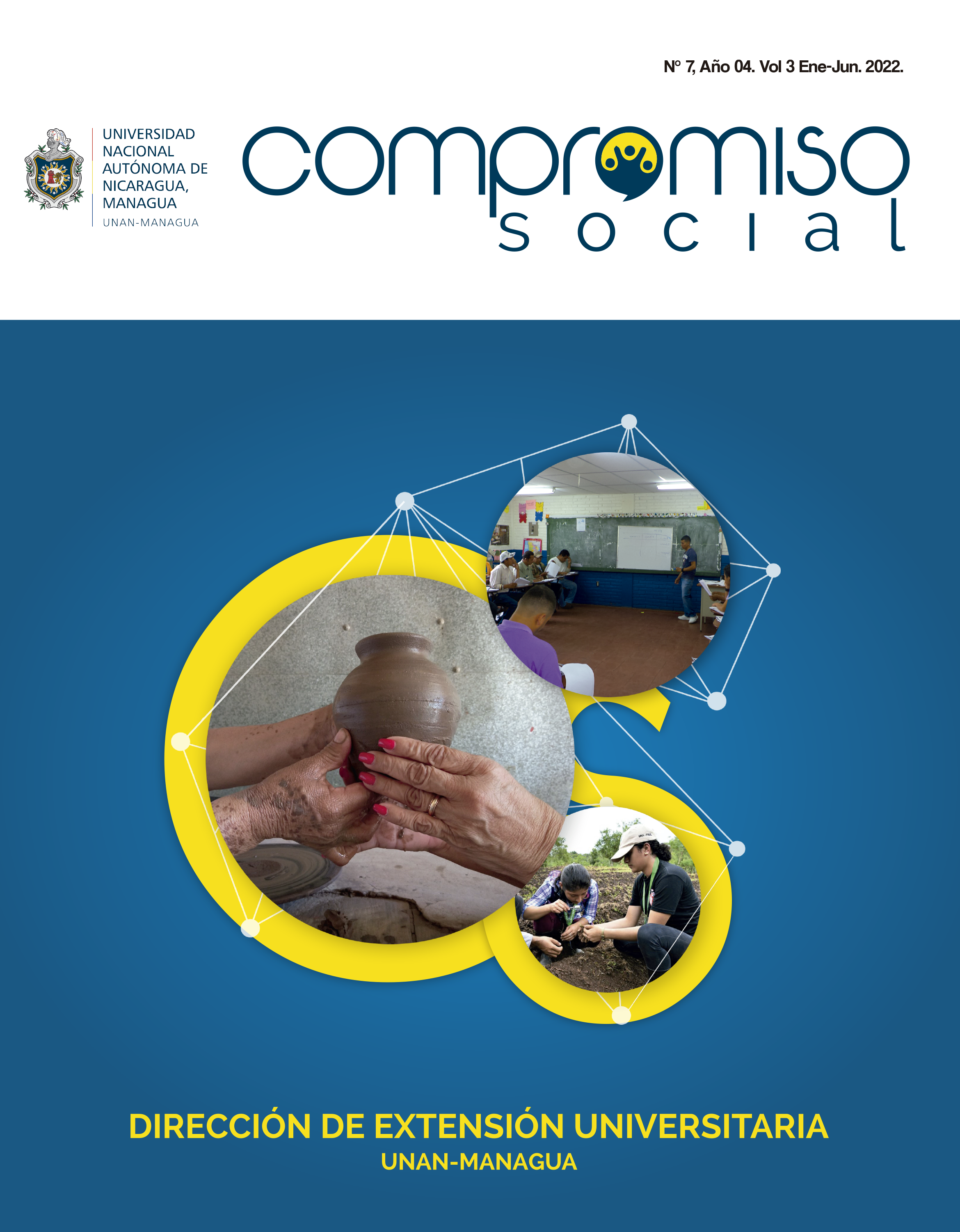Socio-educational experiences developed by the student body of Engineering in Sustainable Rural Development of the UNICAM-Miraflor Estelí Subzone program, UNAN Managua, FAREM Estelí
DOI:
https://doi.org/10.5377/recoso.v3i7.18652Keywords:
UNICAM, socio-educational experiences, experiences, skills, systematization, innovation, entrepreneurshipAbstract
The University program in the UNICAM Field, UNANManagua, established in the Miraflor subzone, in the department of Estelí, represents a transcendental experience for the development of educational opportunities, through the methodology of the New School, the contextualized university training process is developed. to community reality. The systematization aims to rescue, reconstruct and value the socioeducational experiences centered on the experiences accumulated by the student body; it responds to the qualitative paradigm with an approach centered on a participatory intervention process, it is a full-scope systematization, because it encompasses the entirety of the experience. Due to the type of experience, it is a systematization of programs and retrospective, from the last year of execution of the program. There was the participation of 21 students and 5 teachers, who participated in the application of information collection techniques such as: observation, timeline, in-depth interviews, recognition workshop and skills development assessment test. The information was organized and classified based on the two axes of systematization, categories and subcategories, to later move on to the stage of critical and interpretive analysis, identifying the conclusions, lessons learned and recommendations. The results of this academic exercise showed that the professional training process of this group of students is conducive to strengthening their sense of belonging to their reality, developing skills for innovation, entrepreneurship and sustainability of personal and collective resources; enabling survival strategies and socioeconomic development that places them as protagonists of the changes and with an active role contributing to family and community development.
531
References
Acuña, E. F. (2018). Repensando la educación rural en una zona transfronteriza entre Costa Rica y Nicaragua: El caso de la Región Huetar Norte. Revista Electrónica Educare, 15-25.
Echavarría, C., Vanegas, J., González, L., & Bernal, J. (2019). La educación rural “no es un concepto urbano”. Revista de la Universidad de La Salle(79), 23-25. Obtenido de https://ciencia.lasalle.edu.co/ruls/vol2019/iss79/2/
Elena Pisani y Stefano Micheletti. (2018). Capital social y desarrollo rural:. Pensamiento y AcciónInterdisciplinaria, 47-59.
Gordón de Isaacs, L. (2010). La Sistematización De Experiencias: Un Método de Investigación. Enfoque ∙ Revista Científica de Enfermería, VII(2). Obtenido de https://xdoc.mx/documents/la-sistematizacion-de-experiencias-un-metodo-de-investigacion-5f402dea91f90
GRUN. (2017). EJES DEL PROGRAMA NACIONAL DE DESARROLLO HUMANO 2018-2021. Obtenido de http://www.pndh.gob.ni/documentos/planesanteriores/03_PNDH_2017-2021(12dic2017).pdf
Luz Adriana Pita Morales, Wilson Gonzalez Santos, Elnar Daniel Seguera. (2014). Aproximacion del desarollo rural desde la nueva ruralidad. Redalyc. Ciencia y Agricultura, 21-22.
Marchionni, M. (2018). Brechas de género en América Látina. Un estado de situación. Mariana Marchionni. Obtenido de http://scioteca.caf.com/bitstream/handle/123456789/1401/Brechas%20de%20genero%20en%20America%20Latina.%20Un%20estado%20de%20situacion.pdf?sequence=5&isAllowed=y
Pérez de Maza, T. (2016). Sistematización de experiencia en contextos universitarios. Guía Didáctica . Universidad Nacional Abierta. Obtenido de https://cepalforja.org/sistem/bvirtual/wp-content/uploads/2016/04/GUIA-DID%C3%81CTICA-SISTEMATIZACI%C3%94N-abril-2016.pdf
Pita-Morales , L., González-Santos, W., & Segura-Laiton, E. (2015). Aproximacion del desarollo rural desde la nueva ruralidad. Ciencia y Agricultura, 12(1), 21-22. Obtenido de https://www.redalyc.org/pdf/5600/560058660003.pdf
Rojas Meza, J., & Ramirez Juárez, J. (2011). Desarrollo Rural en Nicaragua. Una visión de sus problemas y alternativas. Managua, Nicaragua: Adea- UNAN-Managua.
Salas-Acuña, E. (2018). Repensando la educación rural en una zona transfronteriza entre Costa Rica y Nicaragua: El caso de la Región Huetar Norte (RHN). Revista Electrónica Educare (Educare Electronic Journal), 22(2). https://doi.org/10.15359/ree.22-2.18
UNAN-Managua. (2011). PROGRAMA “LA UNIVERSIDAD EN EL CAMPO”. Ingeniería Rural Sostenible




